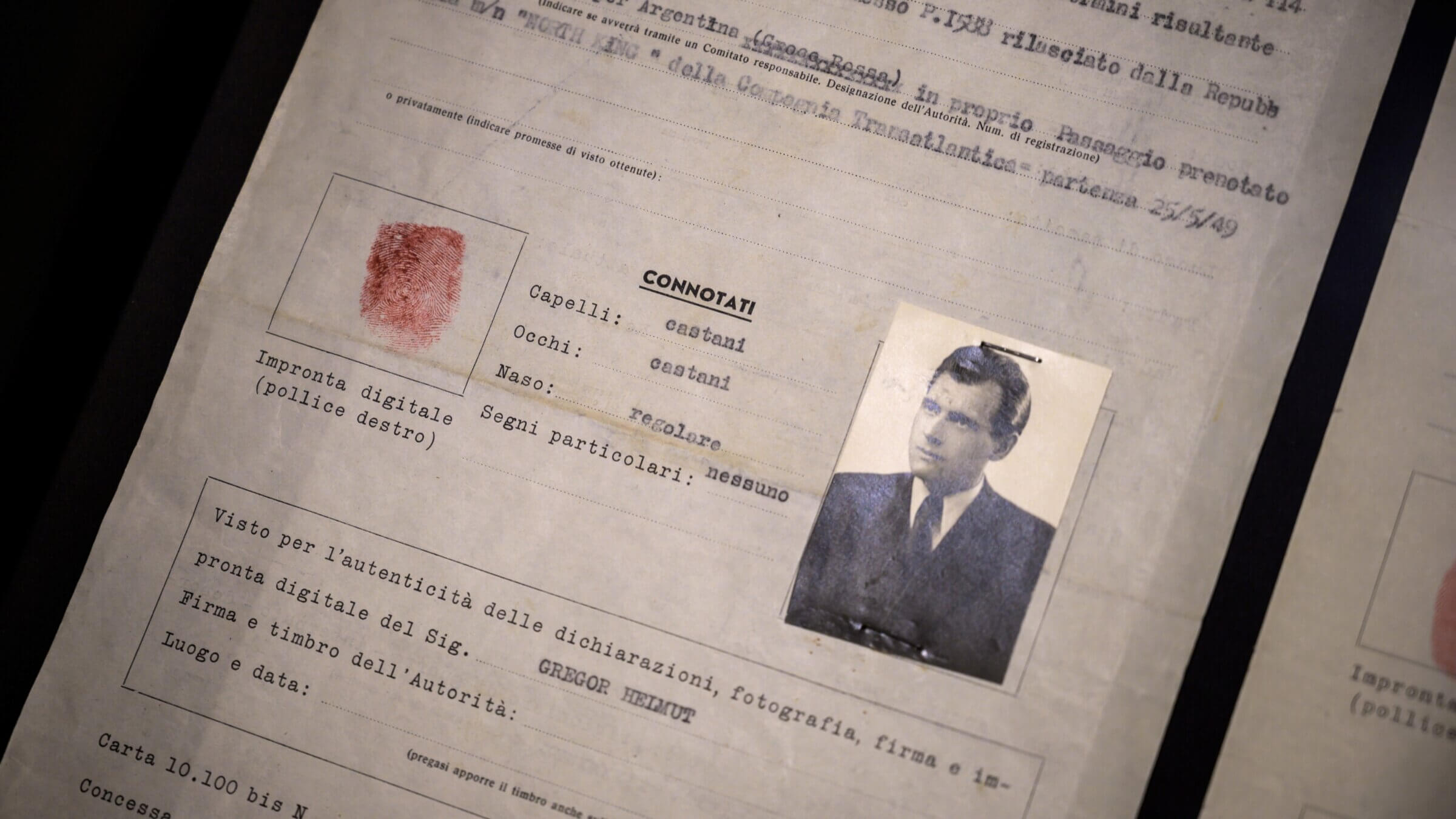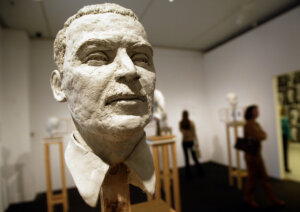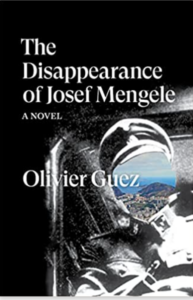Evading American and Israeli authorities, did Josef Mengele ever face justice?
A new novel considers the postwar history of the notorious Nazi physician

A passport issued in 1949 bearing the name “Helmut Gregor,”an alias for Nazi war criminal Josef Mengele. Photo by Getty Images
The Disappearance of Josef Mengele
By Olivier Guez; translated from the French by Georgia de Chamberet
Verso, 224 pages, $19.95
In Olivier Guez’s “The Disappearance of Josef Mengele,” Auschwitz’s notorious Angel of Death is tormented by gruesome nightmares and haunted by visions of crime and punishment.
In one feverish delirium, he is trapped in a labyrinth, with “blood up to his ankles.” Later, the SS doctor sees “the flames of crematoria, dying children whose eyes are pinned up on his laboratory walls like butterflies, Eichmann in his glass cage in the Jerusalem courtroom, a rabbi with long red curls who extracts his bones and throws them into bubbling human fat.”
Pure fiction, of course, in a novel that is mainly anchored in documentary evidence. Guez can only imagine the troubled, if mostly unrepentant, psyche of his protagonist. And the precise contours of Mengele’s relationships — with his two wives, his son and the various allies and enemies he accrues in his South American exile — are at least partial inventions.
But, in truth, it’s often hard to disentangle the history from the fiction, which may be a marker of Guez’s success. The book, now out in English from Verso Books, won France’s prestigious Renaudot Prize in 2017.
The spare, engrossing novel traces Mengele’s peregrinations through Argentina, Paraguay and Brazil, and his eventual decline into physical disability and dementia. Mengele changes names and locations, but never his fundamental nature, or his fate. The Nazi exile, Guez writes, “is marked by the curse of Cain, the first human to commit murder: a fugitive doomed to wander the earth, and to be killed by anyone who finds him.”

The novel begins with Mengele’s inauspicious arrival, as Helmut Gregor, in Buenos Aires and flashes back, through his ruminations, to his earlier life and the Nazi depravities that earned him his nickname.
By perverting the physician’s customary healing role, Mengele came to symbolize pure evil — at Auschwitz-Birkenau and in the postwar cultural consciousness. In thrall to grotesque Nazi racial fantasies, he conducted unethical, painful, often murderous experiments on Jewish and Roma twins and other prisoners at the camp, “a forbidden city,” Guez writes, “pungent with the stench of burned flesh and hair.”
With other camp physicians, Mengele also presided over the “selection” process, sending arriving deportees either to immediate death in the gas chambers or to a slower, less certain death by forced labor, starvation or laboratory experiment.
Guez’s third-person narration tells the story mostly from Mengele’s point of view, which can be tough and unpleasant to inhabit. Occasionally, Guez offers slight relief by veering into the perspectives of other characters, including the Argentinian dictator Juan Perón, an investigator for the Israeli Mossad, and Mengele’s son, Rolf, “tortured by the heavy burden of his toxic father.”
In South America, Mengele is sustained — sometimes enthusiastically but often barely and begrudgingly — by a network of unrepentant Nazis and Nazi sympathizers, fueled by funds from his prosperous family. Guez’s description of this insidious network, with its mix of true believers and opportunists, is one of the novel’s most interesting aspects.
Under Perón, Buenos Aires became a congenial gathering place for Nazi fugitives, many still nursing fantastical hopes of a restoration. In Guez’s telling, Mengele, while working for his family’s agricultural machinery business, initially enjoyed “a highfalutin life” of opera, steak dinners and brothel visits. But, in time, his exile grew harder, in contrast with his legend and portrayals in novels and films such as “Marathon Man” and “The Boys from Brazil.”

With the Israelis nabbing Adolf Eichmann in Buenos Aires in 1960, Mengele’s ability to elude capture only enhanced his villainous allure. Like Bigfoot, he was subject to numerous (erroneous) sightings. Like some deposed European crowned head, he was believed to be living in splendor in a variety of remote haunts, a notion that Guez’s novel helps debunk.
One irony: Mengele was in American custody for a short time after the war, but having successfully concealed his identity, he was released. For a few years, he worked on a Bavarian farm before escaping, in 1949, to Argentina, a country where, Guez writes, “the past does not exist.”
“In this verminous, ruined world deserted by God,” the fictional Mengele thinks at one point, “he has freedom, money, success; no one has arrested him and no one ever will.” His escape was facilitated, Guez suggests, by both German and Israeli politics, which frequently lost focus on Nazi war criminals in favor of more immediate concerns.
Mengele — in both the novel and reality — eventually settled in Paraguay and then Brazil, where he lived unhappily with a farm couple from Hungary, the Stammers, who came to despise him. (In the novel, he has a transactional affair with the wife.) He eventually moves to the Brazilian capital of São Paulo, where he leads a lonely existence, mitigated by a single good friendship and a relationship with his housekeeper. But his material circumstances are difficult, and his health deteriorates.
Guez humanizes Mengele, perhaps controversially, by describing his love, or at least passion, for his wives, the second of whom was his brother’s widow. He also describes the doctor’s regard for his Brazilian housekeeper and his desire to justify himself to his son. In the end, though, the novel portrays Mengele as a thoroughly despicable character, who came to a miserable — if not miserable enough — end.





















